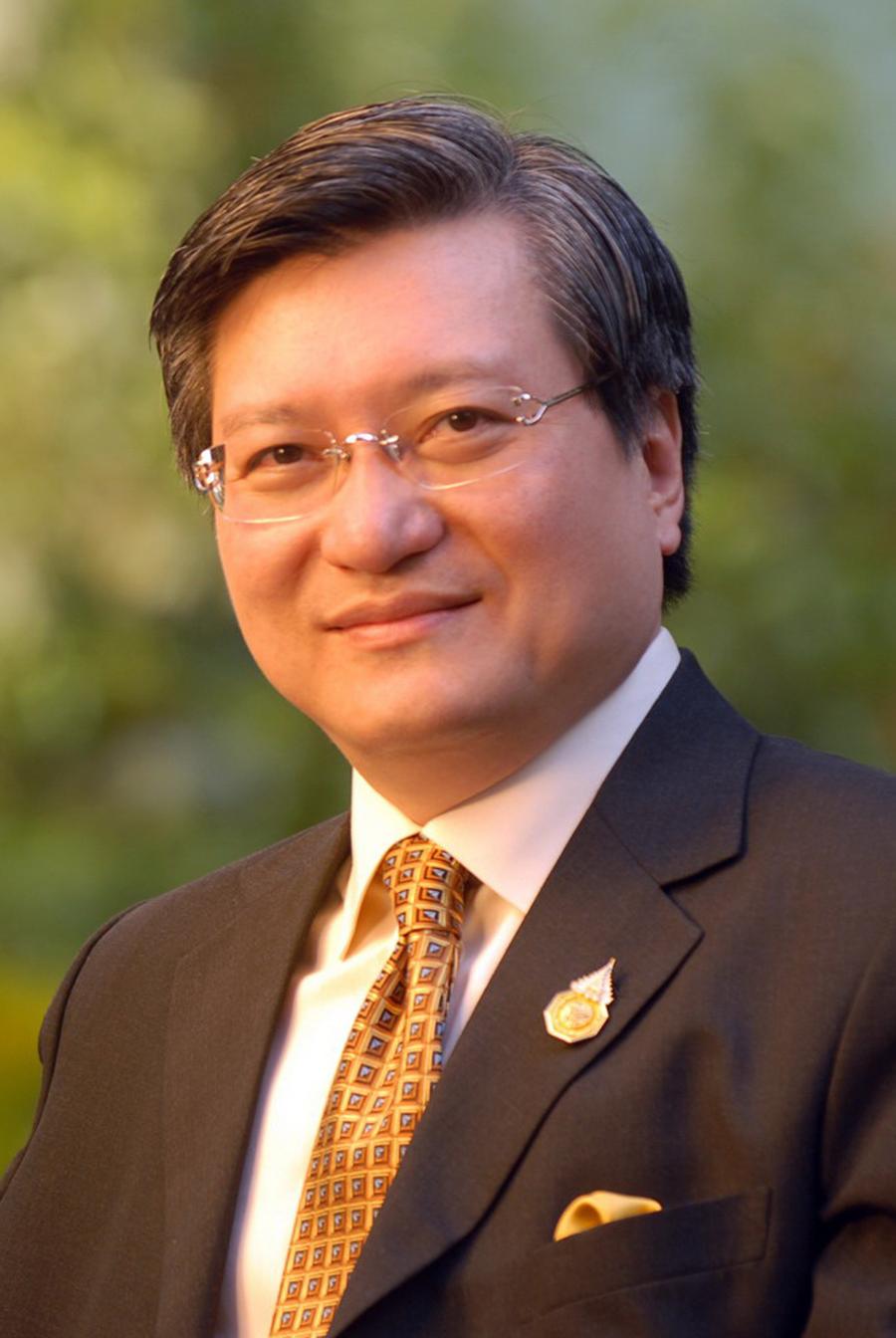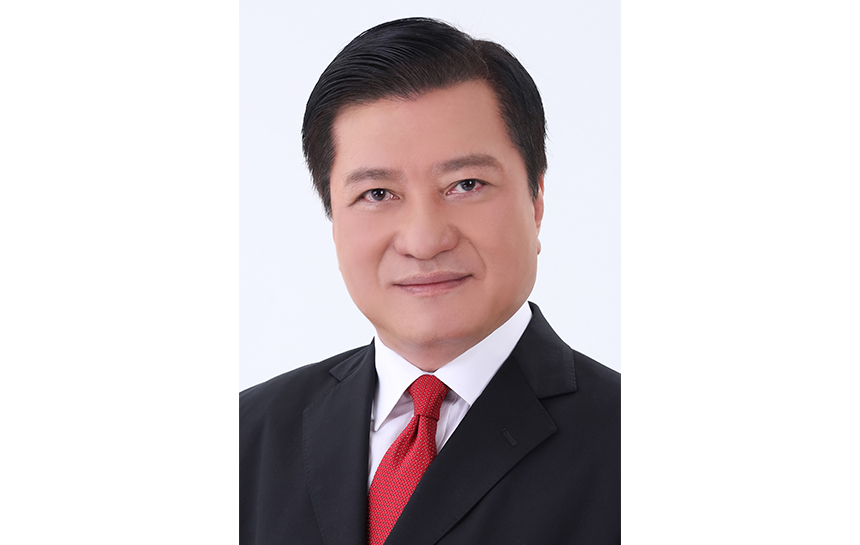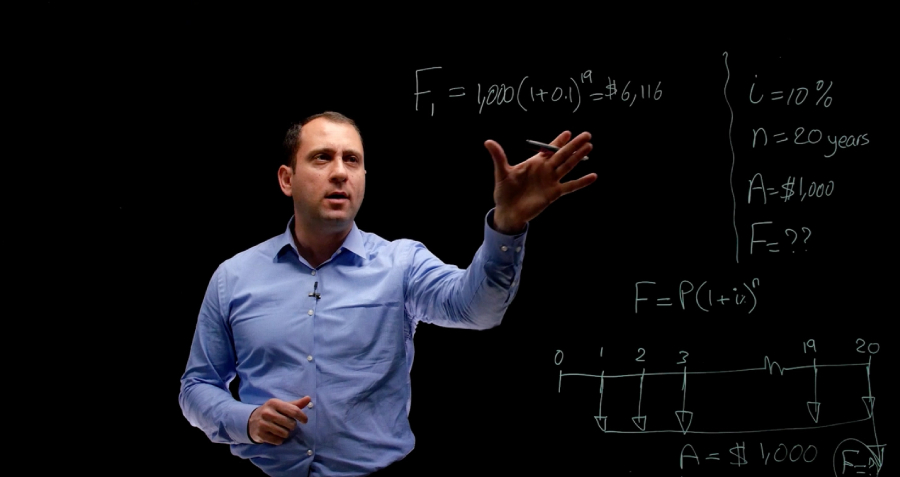 Kriengsak Chareonwongsak, past member of the Thai Parliament and founder of the first future studies research institute in South-East Asia, explores leadership building in ASEAN
Kriengsak Chareonwongsak, past member of the Thai Parliament and founder of the first future studies research institute in South-East Asia, explores leadership building in ASEAN
Kriengsak Chareonwongsak has been a member of Thailand’s House of Representatives, was on the Executive Board for the Democratic Party and is currently a president or member of the boards of several Thai business and development organizations. He also founded the Nation-Building Institute (NBI), which seeks to increase development through leadership and morality training of senior executives and students.
Kriengsak’s many roles in Thai society have made him a popular and highly visible figure, and many of his books have been bestsellers in the country. He is a commentator and columnist, discussing political and economic issues, and his perspectives often feature in the media both in Thailand and internationally.
How do you see China’s relationship with ASEAN countries developing?
I believe ASEAN and China will have a more integrated relationship and that ASEAN will become increasingly reliant on China. China is ASEAN’s largest trading partner and has been for a decade. Therefore, I can only see trade and investment rising to higher levels. The centrality of China’s role in ASEAN will become far greater than we have seen.
The (China-US) trade war has resulted in a slower growth rate for China, with the country needing to look for new markets and build new relationships to help alleviate the effects. Anything to do with freer trade and less restrictions between ASEAN and China will help China in this venture. Therefore, I believe that China will place more importance on ASEAN.
A lot of things that China did in the past will have to change, especially in terms of being more outward looking. It is in a position where it is able to relocate some of its industries into a more cost-effective sphere, which is ASEAN. I believe ASEAN and China will form an effective regional supply chain. The whole supply chain will run through China and ASEAN in a more substantive way. Only growing in terms of trade, however, is not sufficient. There also needs to be an increased level of social engagement. There needs to be an increased level of business taking place between the people of ASEAN and China, as it will allow for the two to connect naturally. China has to become more forward looking—they cannot depend on the old model, because the relationship is growing on every front.
President Xi Jinping has stated that he believes in respect, but I think it has to cascade down to all levels so the mindset becomes that of win-win to help preserve the longevity of working together. There is also the issue of geopolitics, as even though ASEAN is growing in influence, the Chinese are growing far more and have more leverage over ASEAN compared to the US due to the political positioning of China.
When Chinese people come into ASEAN, they have to demonstrate concern for the local people , as China is so big that it is threatening for everybody. Therefore, the gesture of coming in with a win-win attitude will open every heart in ASEAN.
People talk about this being the “Asian century.” How quickly do you see that developing? If it is true that Asia is ascending, what is the role of smaller Asian countries in this rise?
The US will still be a superpower, but the Western century is slowly declining. I do believe that the Asian century is already here, as it has become a region of strong growth. I call it the time for CIA to rise: C for China, I for India and A for ASEAN. The new CIA is the motive for growth and influence in the whole Asian century. If China and ASEAN are able to form a strong bond, it will be the main force pushing the century forward.
An issue that the Asian century will have to grapple with is finding an appropriate and meaningful way to interact with the EU and US. I believe having ASEAN, which is non-threatening, join China, will alleviate some fears that Western powers may have of the Asian century.
The role of small countries is important. In my opinion, Thailand stands to be a big help to China, because it is in the center of ASEAN from a geographical and logistics standpoint. Thailand connects the older ASEAN with the new. The older ASEAN includes Brunei, Indonesia, Malaysia, Philippines, Singapore and Thailand and the newer ASEAN includes Cambodia, Laos, Myanmar and Vietnam. China will do well in the Asian century if they use Thailand as a gateway into ASEAN. The smaller countries in ASEAN cannot match China, but they can be complimentary.
You have done a great deal of work in nation building in various forms. What is your sense of the best process for creating government policies that are effective and sustainable, regardless of the country or culture?
There has to be a bottom-up approach. There needs to be strong civic engagement with civil societies that are alert and willing to engage. That will help bring tremendous unity in the region. With a top-down approach, China will be able to go far but not fully.
I created a new institute for Thailand called the Nation Building Institute (NBI), which is basically a people-focused institute that teaches policy advocacy and undertakes training and research. It’s a community of civil society workers who have an interest in the prosperity of their country. We have created a senior executive class where many deputy prime ministers, cabinet members, civil servants, supreme court judges, attorney general officials, generals, police, business chairmen and CEOs have taken part, and we have even had monks, presidents of universities and prime ministers.
I believe that the model of the NBI is unique, an innovation of the science and art of nation-building. This program will be a big help in unifying the mindset of people to work toward building a society that is prosperous in a sustainable way.
We have 120 elites taking part in each class, with 1,000 people having gone through the program thus far. We have also extended our work to include young people at university and high school levels. We have established nation-building youth clubs in 2,000 schools and in each school we have hundreds of participants. So you can see that soon there will be millions of young people who understand the need for a bottom-up approach to building a nation.
We have seen the entire world build their countries using the top-down approach and only a few countries have succeeded in using that approach thus far. The majority fail badly, but by using a bottom-up approach first and then integrating the top-down approach, a much stronger and sustainable society can be created.
What role should private enterprise and outside players, including academics, play in the development of government policy? What would the “right level” of involvement be?
I believe businesses and entrepreneurs are engines of growth in society. That’s why we have to listen to them, assist them, allow them to experiment and also allow them to fail. We have to allow them to really envision what they think is good for society and let them play a role in the enterprising effort. That will make our society stronger.
The same is true for academics, as they are the brains of society—it is important that they are able to exercise their brains. The problem is that academic teaching is sometimes out of date and they are often not involved in the well-being of society or as experienced as they were in the past. I like the Harvard model, where most of the people who are instructing students have experience in the real world by engaging in social development and policymaking.
I believe this is lacking in Asian society, with academia not linking back into government and public policy. I hope that China and ASEAN, particularly Thailand, can allow entrepreneurs and academics to play a role in the development of the state.
To what extent are culture and socio-political systems factors in the development of economy and the maintenance of prosperity? What advantages and disadvantages do Asian countries have versus the Western model?
The West is good in many things, but also weak in many. We should marry the best of the West and the best of the East. We should not look down on Eastern society, as I believe Asians have a lot to teach the West. We are a very relational society.
I just came back from China and every time I’ve been there, I’ve been invited by government leaders to dinners and other opportunities to socialize. We talk, we joke and we laugh together. That’s not something that happens in the West. Consequently, you don’t go very far, as human relationships are a vital ingredient for doing things together in the long term. It is a model of showing care: you let the heart lead and the head will follow. That’s why I think the West has a lot to learn from the Eastern model of working together and sharing joint concerns. The West always criticizes the East when we give gifts to one another, because they rarely give gifts, but the gift represents more than material value item. It is an expression of caring for one another.
When doing business, leading with your heart will often take you further than just leading with your head. In my opinion, once again, it is best to marry what is good in the East with the West and then we’ll find the perfect balance.
The world seems to be more acrimonious. From a structural and political perspective, why is this occurring? What is the solution?
When the world is desperate and people have fears surrounding security, they often grab anything floating along the river. Politically, in the entire world, we’ve seen people electing unusual candidates to be come presidents, politicians and prime ministers. This is a symptom of crisis. When conventional politicians cannot solve people’s problems, society loses hope and looks for alternatives. Consequently, we are facing a difficult situation, but we have to let the whole thing run its course. Eventually people will turn once more back to normality.
With regard to President Trump, I think he is making gains in the short run at the expense of a loss in the long run. That is not useful for the world or even the US. We have quickly started to see the global impact of the trade war, and I hope that we learn that talking nicely as friends and brothers is better than hostility. We should not use the attitude of win-lose, but instead adopt a win-win perspective. We should stay alert and always look for a solution that is win-win for all.
Do you agree that technology is having an impact on public debate? How can we offset the problems that may come from this?
People have no time to reflect and think clearly. A constant flow of information is bombarding them. Politics has taken a hit as a consequence. It’s easier to influence society now, without necessarily having to reason with the public. Policy has become shallow and is more emotional than cognitively rational. I feel we are in danger because we do not allow modern people to think deeply enough. We need a new kind of politician, a people’s politician that is technology savvy yet morally clear in heart. They have to be reasonable, use their brain and their heart at the same time and articulate policies based on evidence.
Therefore, we have to be more careful in releasing information. It will take a new kind of politician to use the media in the right way and release information that is factual, true, balanced, reasonable and digestible. They need to be able to clearly communicate so that people can understand the world. If we don’t have that, then people are at the mercy of those who are in charge. We have to be careful in this age where it is impossible to distinguish quickly what is fake.
What role do you think millennials and the next generation play and what should they be focusing on to help develop ASEAN countries?
Let’s be realistic. In a few years from now, governance will be in their hands. We older people will be off the scene, therefore, we have to mindfully prepare for the future by preparing the youth of today.
My concern is that we have not allowed millennials to be mentored and trained so that they become ready for the rapid changes that are seen in disruptive times. Millennials today are shaped by the era they grew up in—they are people who no longer reflect deeply. They follow their independent spirit; they no longer want to work hard and have no concern for the collective whole. But when you live in a society, you cannot just be individualistic.
We have to bring the new generation to the mindset where they understand that everyone will be severely damaged if people do not consider society as a collective whole. It is our duty to help them see that—without patronizing them but allowing them to think with us and converse with us. The older generation has not afforded the new generation the time required to shape them into good leaders. I’m fearful because we allow the media to raise our children and we don’t raise them ourselves anymore. Ultimately, I think that we could still have a bright future if we concentrate our efforts on the new generation who will take command of the society in the future.




















